Courses
Courses at Africamps
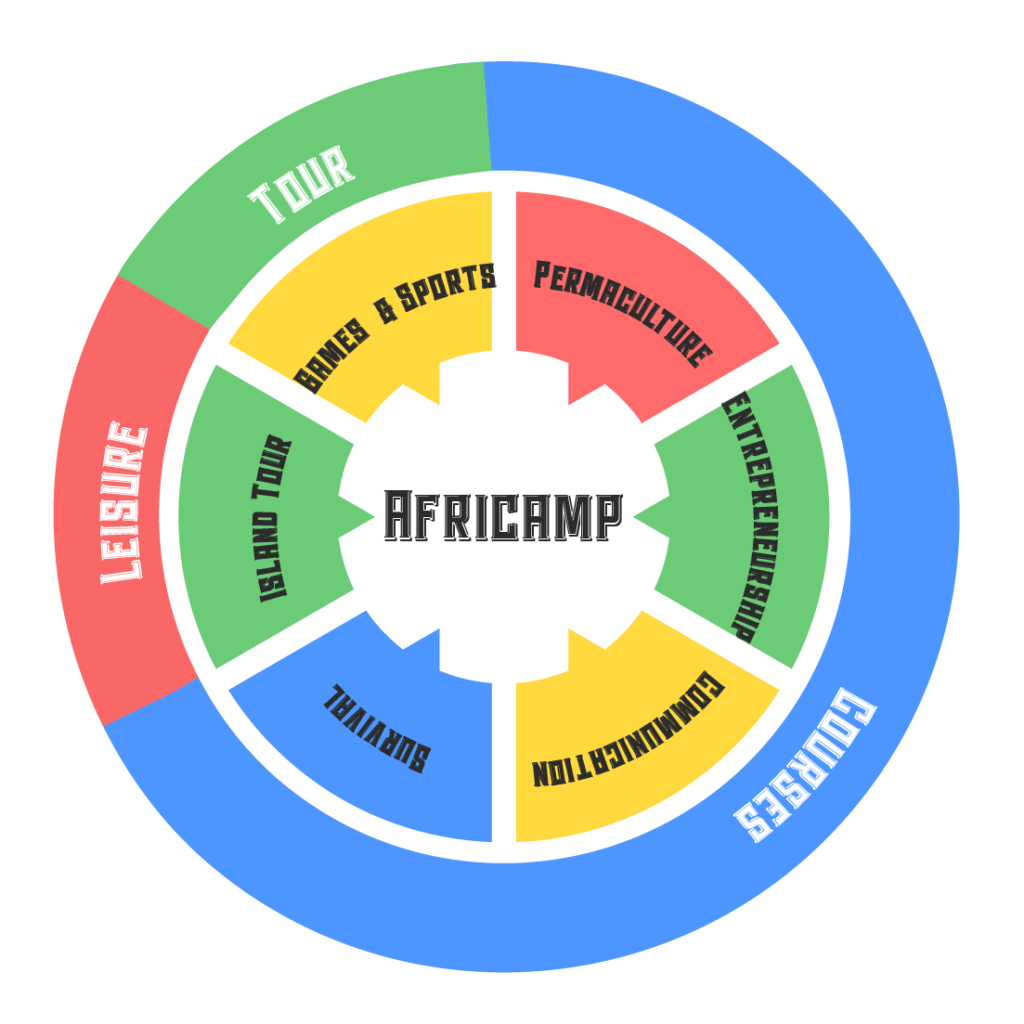
Our Philosophy
We believe in informal education: a camp is more immersive and more memorable than a school lesson.
We believe that real learning is not about memorizing ideas but about doing.
we believe that children should have a say in their education, hence we allow them to choose, follow and assess their own curriculum. They are more motivated and learn more, when they are offered the choice between different courses or activities.
We believe that teaching is not a teacher citing a syllabus, but the teacher and the student interacting with one another. As a result, our courses are more active, creative and experimental in nature: allowing our teachers to have the freedom to choose how and what topics they teach.
We developed the schedule in a modular framework, such that campers can choose to attend different courses throughout the camp. Day by day they can decide whether they want to attend the permaculture, the survival, the entrepreneurship or the communication courses, depending on the topics that are offered that day.
Survival
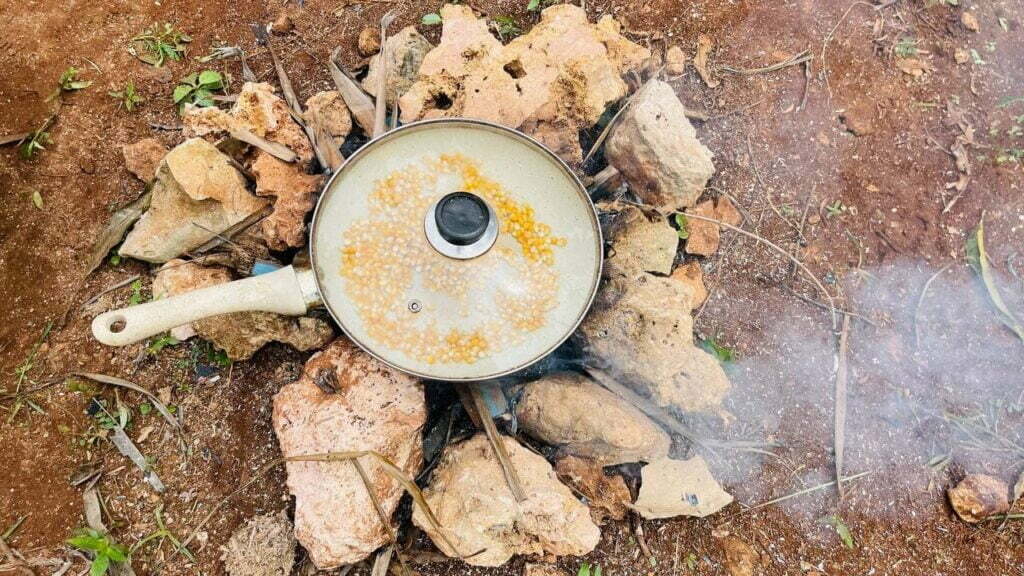
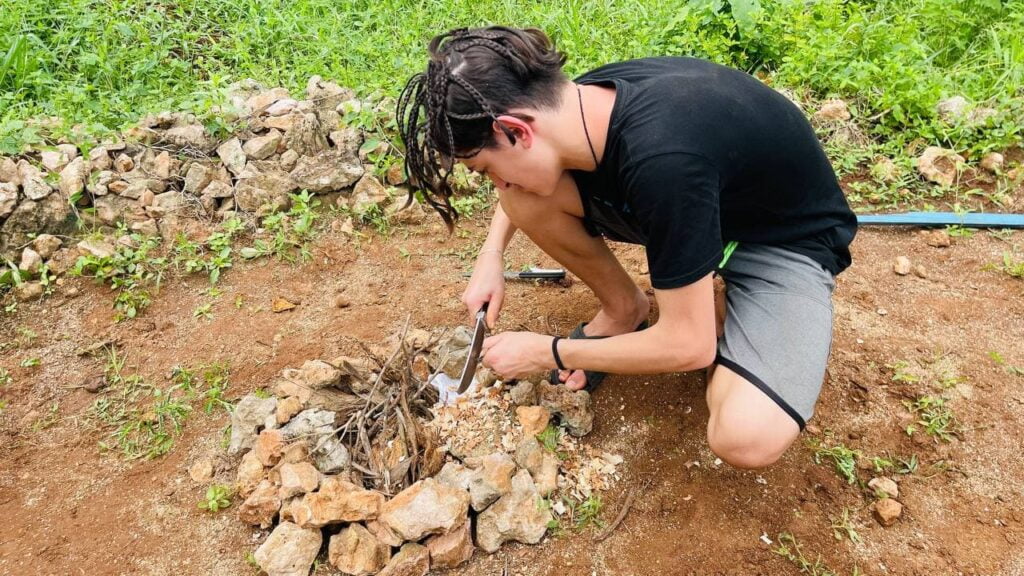
| Description for campers | Description for teachers/parents |
| HOW TO MAKE A FIRE Do you know how to make a fire? In this class, we learn all the ingrediants it needs to make a big fire and how to control it well. | HOW TO LIGHT A FIRE Fire Is the burning sensation we use fire everyday so in this class we learn basic components which make fire. It takes a patient’s commitment to start the fire and this is what children will learn. Once they acquire these skills it something that they can use for their rest of life. |
| COOK YOUR DINNER Do you like chicken and chips ‚well this is the freshest you will ever get.are you strong to kill a chicken?or you will just watch lets find out in how to kill and cook your own food | PREPARE AND COOK YOUR DINNER In order to make responsible decisions about our society and about ourselves we have to understand the choices we make and see the entirety of our decisions. Knowing where our food comes from is import. In this lesson we will cover exactly where food comes from, we will take eggs from chickens. We will also take a chicken, kill the chicken remove the feathers and cook the chicken and eat it. |
| EAT FRESH, FEEL FRESH – HARVEST FRESH FOOD “How is the carrot that comes out of the garden different from the carrot from the supermarket? Which vegetable will give you super muscles? How can you check whether a vegetable is ready to harvest? Why should you grow herbs in your garden instead of buying them in the supermarket?” | EAT FRESH, FEEL FRESH – THE POWER OF HERBS AND VEGETABLES Sometimes it is difficult to see the trees from the woods. We go in depth on how to plant, care for, maintain and harvest common plants such as carrots, spinach, tomato, herbs and many more. This will allow children to create a connection with the food they eat and the garden it is growing in, hopefully instilling a passion for nature and the great outdoors. |
| HOW TO MAKE FRESH WATER Have you ever tried saltwater? It tastes really bad. Come and drink some with using a coca cola bottle and a fire. | DISTILLATION Of the 500 million L of cococola products produced each year, we will take two of the empty bottles and allow the students to educate themselves of how to distil water using these two plastic bottles over a fire. Students will swim to the beach whilst keeping there wood dry, then make a fire and learn how to survive in the wild and convert salt water to sweet water. |
Permaculture
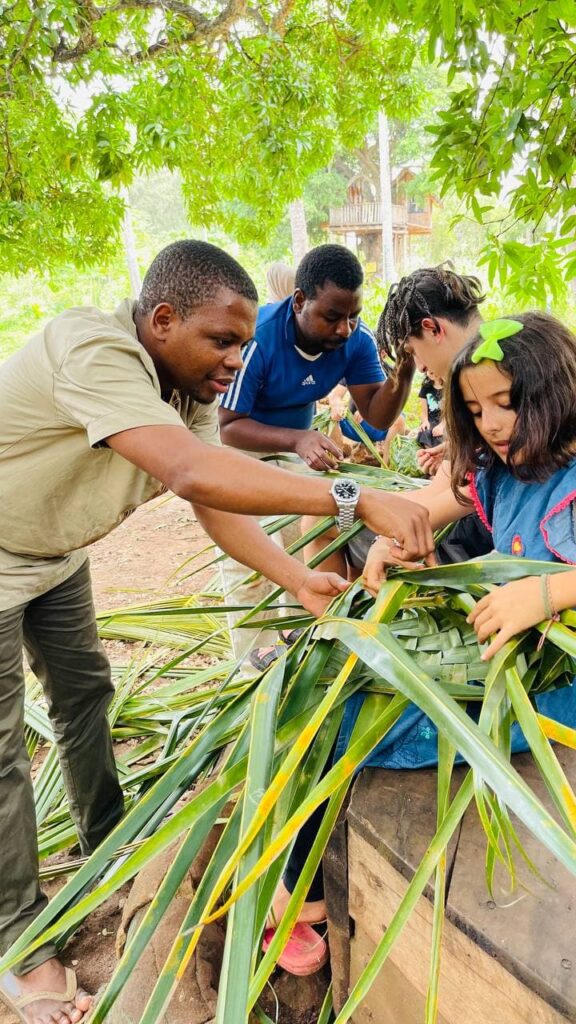
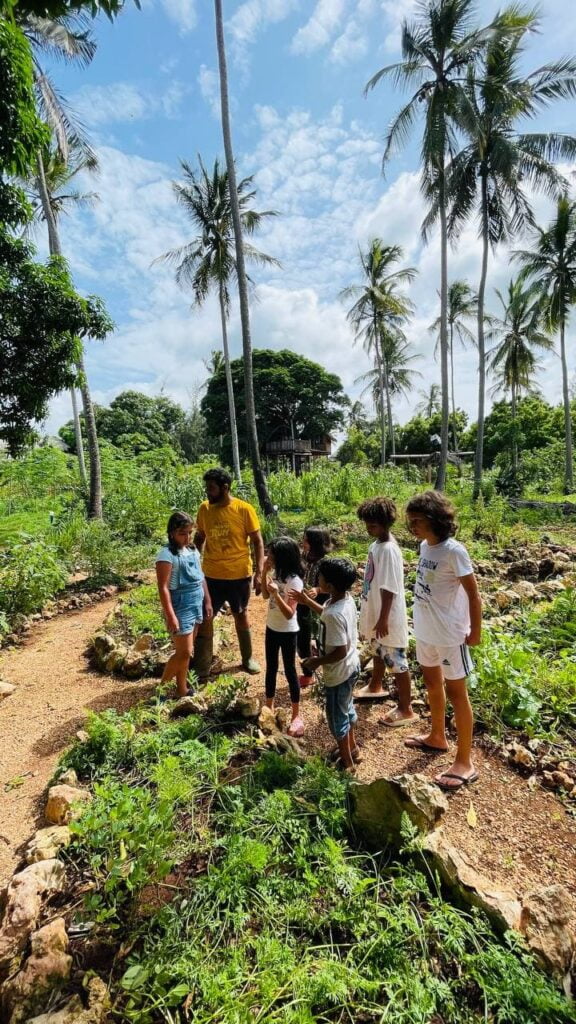
| Description for campers | Description for teachers/parents |
| MICROGREENS – GROWING THE FOOD OF THE FUTURE IN 10 DAYS Are your parents always trying to make you eat vegetables? Do you hate eating vegetables? Would you like to eat 40x less vegetables? Learn how to grow microgreens from seed to leaves in 10 days. | MICROGREENS – GROWING THE FOOD OF THE FUTURE IN 10 DAYS We will discuss how to feed the human race both efficiently and healthily without causing waste or pollution. This will be a practical class where students will get first hand knowledge on how to grow food for themselves in an urban or rural environment with minimal equipment and minimal costs using often byproducts of agriculture. From seed to food in 7 days, we teach children this amazing farming technique that is taking the world by storm. Microgreens are vegetables that only have two leaves but are 40x more nutritious than a mature plant, don’t need any soil and don’t need any fertiliser as we harvest after 10 days |
| EAT FRESH, FEEL FRESH – HARVEST FRESH FOOD How is the carrot that comes out of the garden different from the carrot from the supermarket? Which vegetable will give you super muscles? How can you check whether a vegetable is ready to harvest? Why should you grow herbs in your garden instead of buying them in the supermarket? | EAT FRESH, FEEL FRESH – THE POWER OF HERBS AND VEGETABLES Sometimes it is difficult to see the trees from the woods. We go in depth on how to plant, care for, maintain and harvest common plants such as carrots, spinach, tomato, herbs and many more. This will allow children to create a connection with the food they eat and the garden it is growing in, hopefully instilling a passion for nature and the great outdoors. |
| HOW TO FEED 14 BILLION PEOPLE How much water does a cow drink in 5 years? How much water does a bean drink? Is there enough water for all humans or only the rich? Are you the next superman, can you help save the planet? | HOW TO FEED 14 BILLION PEOPLE We will take students on a journey through the current human food cycle. How many people are fed and nourished on a daily basis? We will calculate how much water is used for the production of a cheeseburger and how much is used for a plate of beans. We will allow students practical application of this knowledge by collecting the actual food a cow will eat in one day. This will give us an insight in the future problems the human race may run into, allowing students to creatively solve problems and see the bigger picture. |
| LIGHT BULB EXPERIMENT Do you love lighting bulbs? Then this is the right place for you. With just a bulb, battery and wires we will build simple light bulbs which you can use to light during the night. Want to know how your torch works? It’s Possible. Can you survive when there’s no power/electricity? Come and meet fellow innovative and creative children and get to know how to survive during a black out. | SCIENCE EXPERIMENTS A creativity and practical class that campers will be taught about electricity for kids with this simple and amazing light bulb experiment! This light bulb science project only requires a couple materials and can be made from an incandescent light bulb just like Thomas Edison did! This electricity experiment for kids is fun for kids of all ages. Campers will learn science basics such as drawing circuits, parallel and series connections, batteries, and bulbs. The course will bring campers to interact with electric components such as bulbs, batteries, and wires. The children have to plan and make their own circuits with batteries and wires so they can light bulbs. The course will have tasks group into three, 1. Active learning session where students will learn about simple terminologies including current, circuit, battery/cell, bulb, parallel, series, watts, volts, amps, and load Students will learn different connections of batteries so as to light a bulb. 2. Interactive learning session, where campers will learn different tools and materials that they will use to make their light bulb experiment, students will get to know how to use tools including, scissors, multimeter, connecting wires, connecting batteries and more other materials. 3. Practical time, with supervision and assistance from the course teachers students will get to practically design and construct a complete circuit that will light their bulbs.All steps are carried out by the participants. |
| PRODUCE ELECTRICITIY WITH FRUITS do you know that we can make electricity with fruits? Do you know that some fruits can produce more electricity than others? Dou you want to produce electricity with fruits? Then don’t miss this course. | MEASURE HOW MUCH ELECTRICITY IS IN WHICH FRUIT doing science experiments helps to develop a child’s resourcefulness, particularly their skills at goal setting, planning and problem solving. This lesson nurtures intellectual curiosity, helping children to acquire new ways of asking questions and understanding the world. When life gives you lemons, turn it into electricity. https://interestingengineering.com/100-natural-energy-how-you-can-create-electricity-from-fruits In this lesson, we will produce electricity using different kinds of fruit and vegetables, and we will measure which produces the most electricity |
| HOW TO MAKE COCONUT OIL do you know how beneficial coconuts are? Do you wish to make and use non chemical coconut oil? Then you have got a right shot to learn and explore more. | PRODUCE ORGANIC COCONUT OIL during this practical lesson, campers will produce organic coconut oil directly from a fresh coconut. This will give them a deeper understanding where our everyday products come from and hopefully build up a connection to nature. |
| NAKED EGG can we remove the shell of an egg without breaking it up? | NAKED EGG Egg shell is made of calcium carbonate. In this experiment we will remove the egg shell without breaking it up. |
| TRASH TO CASH – COMPOST Do you love chips? Do you know where they come from? Have you ever discussed the best way to prepare them? In this class we will discuss on how farmers make cheap and environmental friendly fertlizers which is used to fertilize Potatoes and serve them as chips. | COMPOST MANUFACTURING PROCESS “ All of our food comes from earth, when earth is filled with much nutrition we need to use less chemical fertilizers. Children will learn how to make compost using nautral materials and learn how to recycle all the food and poo produced from the home. Students will actively work in stepd to create compost. 1. a layer of brown leaves will be put. 2.manure or cow dung will be added to the pile. 3.Green leaves will be added( 30% ). 4.Brown leaves will addded. 5.Food waste will be added to the pile. 6.Second layer of brown leaves will be added. 7.Manure will be added. 8.A layer of green leaves will be added. 9.Top layer of brown leaves will be added. 10.Lastly the compost pile will be watered and covered. |
Communication
| Description for campers | Description for teachers/parents |
| BODY LANGUAGE – UNLOCK HIDDEN MESSAGES If you want to unlock the hidden messages, people give… If you want to know, how to talk with your body… If you want to know, what you can change with your eyes or a true smile… Or if you want to reveal the power of your hands, this class is perfect for you! | BODY LANGUAGE: HOW TO COMMUNICATE AND PRESENT WITH CONFIDENCE & HOW TO READ THE FEELINGS AND THOUGHTS OF OTHERS We use body language all the time. By the way we are looking, listening, moving, and reacting we communicate our thoughts and feelings. This way of communication with our body is known as non-verbal communication. The ability to know what you are communicating through your body unconsciously is an important skill to align your verbal and non-verbal communication. Once you learn how to read and use body language, you will be able to communicate more effectively with colleagues and family members. In this class, the students will get the opportunity to discover their own body language and of others. The children will learn to read facial expressions, hand gestures, body posturing and unconscious movements. The class will start with the introduction of common gestures in the child’s own culture. Through the encountering with other cultural behaviors, it will be seen that some behaviors are common and universal, whereas other are not. Through small stage plays, the range of body language will be shown. Afterwards the types of body language will be discussed. The aim is to display the characteristics and effects of each body language type. Once the elements and types of body language are understood, an interactive training session will follow. Analyzing and interpreting one’s conversation partners will be practiced. In addition to that, the children will learn to hold an expressive presentation. During the training, the teacher will support by giving important tips to make their presentation more meaningful and engaging. |
| HOW TO NEVER ARGUE AGAIN Have you ever wondered why arguments happen? Do you sometimes feel there would be an easier way to say something? Have you ever wondered, how many emotions you can feel and whether you can have multiple emotions at the same time? Do you want to learn how to evade any argument? If any of these questions apply to you, ‘How to never argue again’ is the perfect course for you. | NONVIOLENT COMMUNICATION In this course, we explore the concept of non-violent communication in a simplified and easily accessible manner. The children will gain insight into models of listening to each other, distinguishing between feelings and observations, being aware of their own feelings and expressing themselves respectfully. It is this course’s core objective to show the influence of language on personal relationships and the importance of conscious communication in a manner which is easily understandable from anyone over the age of 7. Course objectives: I can describe my situation without judgment I am aware of my feelings I know that feelings are caused by fulfilled/unfulfilled needs and can ask “Why am I feeling this way?” I can express my needs politely taking over the responsibility for my actions I know how to ask for what I need respectfully” |
| THE POWER OF SAYING “NO!” You know what? Saying ‘no’ isn’t as easy as you may think it is. Saying ‘no’ is about knowing your own power and being able to make out the situations in which it is necessary. If you want to say ‘no’ many times today, visit the class ‘the power of saying no’. | ASSERTIVENESS “It is a crucial skill to say ‘no’ and know your boundaries. In our ‘assertiveness class’, we will be dealing with the concepts of personal space, boundaries and the right to say ‘no’ and have your own opinion as we believe this to be necessary for every respectful interaction. It is goal to encourage childrens’ confidence and their belief in themselves. Course objectives: Knowing your own physical boundaries I can decide where my boundaries are and protect them I am aware of the boundaries of others and respect them I can defend my own ideas |
| FRIENDSHIP Who doesn’t love a good friend? In this class, we want to talk about friendship and how to meet people – a skill you may have been using at the camp already? We want to take the class time to play some friendship games, talk about what a good friend means to us and even make some friendship bracelets if you want to. Are you ready to become a friendship-expert? | FINDING FRIENDS “We cannot be happy without having good friends and there are many tips which can help everyone in building strong connections to others. In this course, we are focusing on ‘what a good friendship means’ and ‘simple strategies for approaching new people and forming connections’ in a playful manner. We believe friendship to be a groundstone to every Assalam camp and want to provide the best possible environment for the children to socially interact in a joyful and respectful way. Course objectives: I know what a good friend means to me I know how I can connect to others effectively I know simple strategies to make friends with others |
Entrepreneurship
| Description for campers | Description for teachers/parents |
| CREATE AND MANAGE YOUR OWN TOY COMPANY Would you like to design and sell your own toy? Do you like watching advertisements? If your answer is yes, you are going to enjoy this class so much. In the class, you are going to create your own toy company with your teammates and find out how to make more money. One more fun activity, you will take an advertisement video with your friends. Let’s laugh together 🙂 | CORPORATE ROLEPLAYING Corporate Roleplaying is a class that aims to simulate the corporate functions and structure on a basic level for the kids. This allows the kids to understand how a business works in the simplest way through having fun in the process. Furthermore, it includes team-work and leadership since it provides a role per student and the responsibilities that come along with the role. The class starts with building teams of 5 people and asking them to come up with an idea of a special toy. The first stage is to create a company name and slogan, and draw a logo. It is followed by allocation of the head of departments for marketing, production, human resources(for kids: workers), finance(for kids: money) and public relations(for kids: client happiness). The department heads start working on their strategies and they end up with a corporate structure at a simple level. The kids are expected to answer questions such as the way that they would advertise their product, how much would the production cost, strategies to test the satisfaction of the clients. They are expected to present their ideas as a group at the end of the class and create an advertisement video with the help of young leaders. |
| CREATE AND MANAGE YOUR OWN TOY COMPANY Would you like to design and sell your own toy? Do you like watching advertisements? If your answer is yes, you are going to enjoy this class so much. In the class, you are going to create your own toy company with your teammates and find out how to make more money. One more fun activity, you will take an advertisement video with your friends. Let’s laugh together 🙂 TRADE GAME Have you ever tried to trade? In this real time game, you will produce stone, wood, or food and trade it with your friends. Make sure to negotiate hard to get a good price for your goods. | PEASANT BUSINESS SCHOOL Peasant Business School is a real time trading game for 12 to 32 players developped by a Polish University: csb.mik.krakow.pl/en/peasant-business-school/ which teaches economic mechanisms and negotiation skills in a dynamic and immersive way. We adapted the game to Zanzibar and will play it together. |
English
We believe that languages are learnt best by talking to someone who matters to you and by having something to say that matters. This is the way how a child learns his native language. He wants to express himself, and so he does. He does not learn the language because he is supposed to learn the language for later use, but because he wants to use the language now because he has something to tell and someone who matters to him who listens. It is a natural and fun way to learn a language. In the camp we strive to create situations like these where children can use language naturally.
To boost their understanding, for each course and each camp activity, we prepared a set of key vocabulary which is used during the class, which we translated from English to Swahili, German, Turkish, French and other languages, such that the children have access to the key vocabularies in their native language.
For example, for the above listed course “Microgreens – growing the food of the future in 10 days”, participants will receive the following vocabulary list with translation into Swahili, Turkish, German, French or another language they know:
| Microgreens | to water / irrigation | to sprout | to sell | mould |
| Vitamin | Water | to grow | to plant | moisture |
| Vegetable | Hydroponics | healthy | to harvest | darkness |
| Seed | Fertilizer | vegetarian | garden | sunlight |
| Soil | Tray | vegan | to cut | weight |